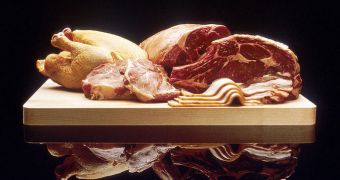A new report, released just days ago by the United Nations Environment Program (UNEP), provides nations and scientists with the first-ever global view of the planet's situation at this point. The document highlights the troubling fact that the harshest factors driving habitat loss, species extinction and pollution at this point is our never-ending quest to produce more food. This demand is in turn driven by the fact that Earth's population is very large, and estimated to get even larger by 2050.
According to median estimates from the UN, the world will become home to no less than 9 billion people within 40 years, and this will place additional strain on existing resources, ecosystems, and food production abilities. However, agriculture and food consumption are the most disruptive and polluting aspects of human presence on Earth. Forests, and the ecosystems and habitats that go with them, are constantly being cut down to make way for farms that generally grow animals or small amounts of vegetables and other plants, AlphaGalileo reports.
The UNEP investigation is called “Assessing the Environmental Impacts of Consumption and Production: Priority Products and Materials,” and its lead author is Norwegian University of Science and Technology (NTNU) professor of energy and process engineering Edgar Hertwich. The expert is also the director of the NTNU Industrial Ecology Program. He was a part of the team that spent the better part of the last two years answering three questions: what are the most important industries that cause climate change?; how much energy do different consumption activities require when the production of the products is taken into account?; and what are the materials that contribute most to environmental problems?
Hertwich declared himself stunned to find out that agriculture has environmental impacts that exceed those of the cement industry, for example, in the amount of damage they inflict on the environment. “[...] impacts from agriculture are expected to increase substantially due to population growth, increasing consumption of animal products. Unlike fossil fuels, it is difficult to look for alternatives: people have to eat. A substantial reduction of impacts would only be possible with a substantial worldwide diet change, away from animal products,” the expert adds, referring specifically to meat.
Another problem with the current food system is widespread waste. “Between 30 and 50 per cent of all food produced is spoiled or wasted. It's really quite surprising how much food waste there is,” the lead author says. He explains that the developing world wastes food through improperly transporting it to its destination, whereas developed countries waste it by buying in excess, and then keeping it in the refrigerator. “There are fundamental challenges out there that I don't think that we as a society have woken up to yet. Somewhere in our rear-view mirror there is a big monster, and we are pretending it is not there. But I think if we really decide to tackle these challenges we will be able to do so,” Hertwich concludes.

 14 DAY TRIAL //
14 DAY TRIAL //